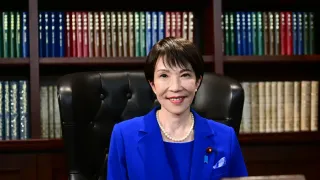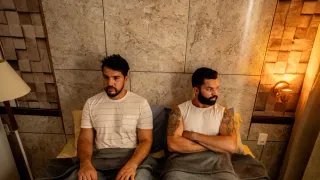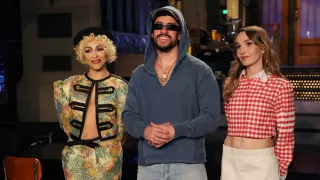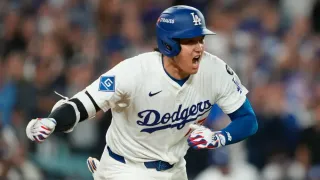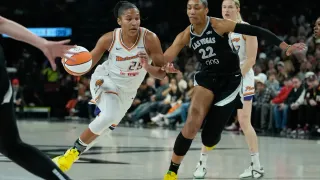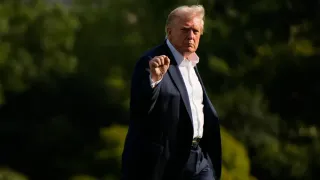January 23, 2015
Black Lives Matter Panel Sparks Dialogue
Kilian Melloy READ TIME: 4 MIN.
Four black women leaders talked about the origin of #BlackLivesMatter, their reasons for being involved in the movement, and what others can do to help during a packed discussion at the Women's Building Tuesday night.
The January 20 panel, entitled "#BlackLivesMatter - United We Win," was hosted by the Harvey Milk LGBT Democratic Club.
Alicia Garza, who identifies as queer, is a co-founder of Black Lives Matter and the special projects director for the National Domestic Workers Alliance. She opened the discussion with the history behind the hashtag and its origin in 2013 after the acquittal of George Zimmerman for the fatal shooting of Trayvon Martin in Florida.
"A group of friends and I were sitting at a bar, and we were waiting for this verdict," Garza said. "When George Zimmerman was acquitted, it felt like we got punched in the stomach."
She wrote about the case and ended her post with the words "Black Lives Matter." The phrase resonated. Soon Garza, along with Patrisse Cullors, founder of Dignity and Power Now in Los Angeles, and Opal Tometi, executive director of the Black Alliance for Just Immigration, had joined forces to help the movement grow. The three queer women had started something big.
"We didn't start this movement. We breathed some life into an idea, into a set of values and vision of what we thought the world should look like," Garza said.
"Black Lives Matter" spread on the streets as demonstrators invoked the phrases in protests following Zimmerman's acquittal. Since its inception, Garza said, the online #BlackLivesMatter platform also has been used to create space for conversation around other issues impacting the black community.
"The fundamental principle behind black lives matter is that our society is built on anti-black racism," Garza said.
For many in the movement, that racism intersects with dangers they face in society based on sexuality and gender identity.
Panelist Janetta Johnson is an organizer with the Transgender, Gender Variant, and Intersex Justice Project. She expressed the urgency of a movement to address structural violence against black transgender women.
"Right now if I leave here tonight and I was brutally attacked, I wouldn't call the police and I wouldn't call the ambulance. I would just go home and try to take care of myself. Because why re-traumatize myself?" Johnson said.
Johnson said that Black Lives Matter can't be another movement that puts trans people last, and pointed out that there were few black trans people in the audience.
"We need support moving forward, and traditionally we haven't been supported," Johnson said.
When Garza next spoke, she acknowledged Johnson's points. "We're queer, so we're supposed to be a part of the same community. But I have a level of privilege in relation to you. If we're not having that conversation then we're not really about this life," Garza said.
For a truly effective movement, Garza said, just "being inclusive" is not enough.
"We're trying to do the work that we need to do, even as queer folks, to make sure that our spaces are - not 'inclusive.' That's not what we're talking about. We're talking about elevating the leadership of folks that are not at the center," Garza said.
The panel also discussed the importance of youth leadership, and Hatim Mansori, a junior at Mission High School and president of the high school's Black Student Union, gave a quick description of his organizing strategies.
As moderator, Milk Club executive board member Mahnani Clay also asked how police can get involved.
"I have friends and family in law enforcement who are sympathetic to the cause and want to help, but have no idea where to start," Clay said.
It was an unexpected question for leaders in a movement largely focused on police brutality.
As part of their response, panelists named some of those killed by San Francisco police in recent years.
"We still have questions around Alex Nieto, about O'Shaine Evans, about Kenneth Harding," Garza said.
"I'm not going to say I'm police friendly, I'm not going to say I hate all police. I hate the system," said panelist Neva Walker, executive director of Coleman Advocates for Children and Youth.
Walker and a few other panelists said that they, too, had family and friends in law enforcement. Walker said that police who want to help can begin by trying to change the practices of their police unions.
San Francisco Sheriff Ross Mirkarimi, who attended the panel, agreed, acknowledging the influence of the police union in city politics.
"City Hall and the mayor and everybody else essentially subordinates themselves to the police union. That needs to be discussed. That's true for our department, too," Mirkarimi told the Bay Area Reporter .
Panelist Thea Matthews, president of the Black Student Union at City College of San Francisco, encouraged police who support the movement to speak out publically.
Garza agreed. "Police should be standing up and saying, this is actually about integrity in our jobs. This is not what we're supposed to be doing," she said.
"We have a lot of work to do if we think policing should be about solving problems, and not police being judge, jury, and executioner," Garza added.
The panel received a standing ovation, and the people in the packed room began to stream out onto 18th Street. Being out in public again brought to mind Johnson's words - her description of what she would do were she to be attacked that very night.
Garza said that, after hearing Johnson's concerns about centering trans leadership, she plans to have a conversation.
"We're going to do a lot of listening. We're going to ask her, what do you need from us," Garza said.
